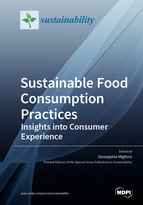Sustainable Food Consumption Practices: Insights into Consumer Experience
A special issue of Sustainability (ISSN 2071-1050). This special issue belongs to the section "Sustainable Food".
Deadline for manuscript submissions: closed (31 December 2020) | Viewed by 110377
Special Issue Editor
Interests: consumer studies; consumer behavior; organic food consumption; sustainable food consumption
Special Issues, Collections and Topics in MDPI journals
Special Issue Information
Dear colleagues,
It is my pleasure to extend this invitation to potentially interested researchers in the field of sustainable consumption. In recent years, the increasing consumer concern towards food safety, environmental sustainability and social justice issues have stimulated new consumption practices more oriented towards social, economic and environmental sustainability (Migliore et al., 2015; Graziano and Forno, 2012).
These include the growing consumers' preferences towards organic food, local food, and other sustainable foods and beverages consumption (Galati et al., 2019; Feldmann and Hamm, 2015), as well as the spread of alternative distribution chains, which emphasize the short-distance transportation of food and the direct relationship between consumers and producers (Hashem et al., 2018).
In addition, these sustainable consumption practices seem also to involve tourist destination choices (Cucculelli and Goffi, 2016), rural tourism and gastronomy interest (Green and Dougherty, 2008).
This Special Issue aims to contribute to the literature on sustainable consumption practices by enriching discussions on consumers experiences and by emphasizing the motivational and demographic factors as well as the cultural and situational factors that guide consumer behaviour towards these practices.
Dr. Giuseppina Migliore
Guest Editor
Manuscript Submission Information
Manuscripts should be submitted online at www.mdpi.com by registering and logging in to this website. Once you are registered, click here to go to the submission form. Manuscripts can be submitted until the deadline. All submissions that pass pre-check are peer-reviewed. Accepted papers will be published continuously in the journal (as soon as accepted) and will be listed together on the special issue website. Research articles, review articles as well as short communications are invited. For planned papers, a title and short abstract (about 100 words) can be sent to the Editorial Office for announcement on this website.
Submitted manuscripts should not have been published previously, nor be under consideration for publication elsewhere (except conference proceedings papers). All manuscripts are thoroughly refereed through a single-blind peer-review process. A guide for authors and other relevant information for submission of manuscripts is available on the Instructions for Authors page. Sustainability is an international peer-reviewed open access semimonthly journal published by MDPI.
Please visit the Instructions for Authors page before submitting a manuscript. The Article Processing Charge (APC) for publication in this open access journal is 2400 CHF (Swiss Francs). Submitted papers should be well formatted and use good English. Authors may use MDPI's English editing service prior to publication or during author revisions.
Keywords
- Local food
- Organic food
- Sustainable food and beverages
- Sustainable tourism
- Rural tourism
- Alternative food networks
- Consumer behaviour.






